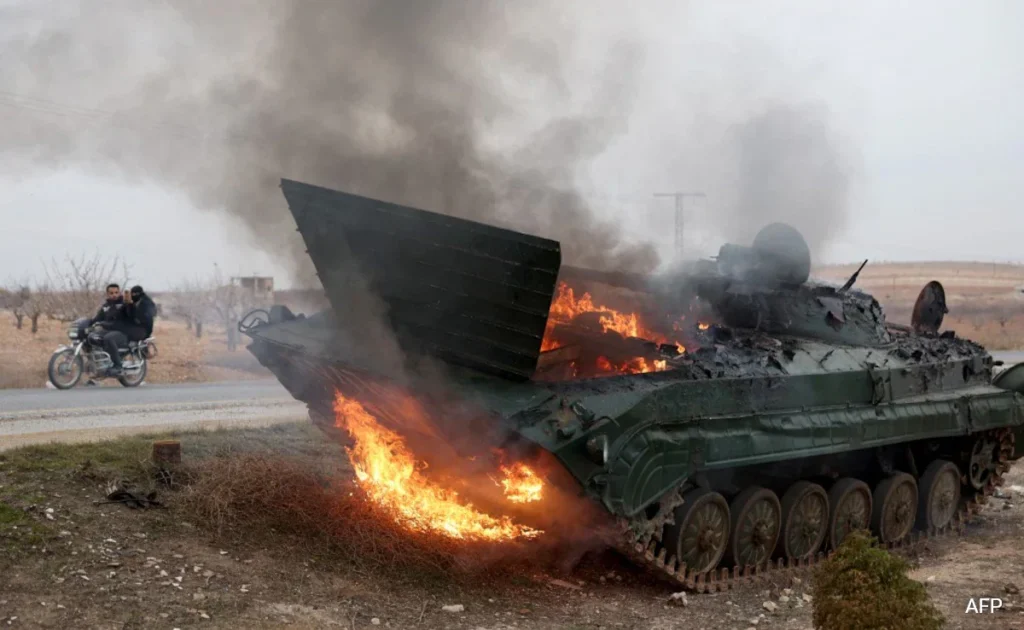
Syria News The Situation on the Ground
Table of Contents
The Syrian conflict, dormant for a time, has reignited with alarming intensity, placing the nation on the brink of chaos. Rebel forces, emboldened by their recent gains, claim they are closing in on the capital, Damascus. On Saturday, rebel commander Hassan Abdel Ghani declared, “Our forces have begun the final phase of encircling the capital,” signaling a decisive moment in their campaign. Despite these assertions, the Syrian government, led by President Bashar al-Assad, has categorically denied any such advancements or withdrawals from the Damascus countryside.
This renewed offensive comes just over a week after the conflict surged back into international focus. While the rebels’ claims are difficult to verify due to restricted access and conflicting reports, their momentum underscores the precarious balance of power in the region.
The Islamist Alliance Takes Center Stage
Central to the rebel forces’ advance is Hayat Tahrir al-Sham (HTS), a prominent Islamist group with roots in Al-Qaeda. The group’s leader, Ahmed al-Sharaa, also known as Abu Mohammed al-Jolani, has made a calculated move to garner broader support. Addressing fighters through a statement on Telegram, he urged them to prepare for the final push toward Damascus, saying, “Damascus awaits you.”
Notably, al-Sharaa used his real name instead of his nom de guerre, signaling an attempt to shed the group’s extremist image and appeal to minority groups in newly captured territories. This strategic pivot reflects HTS’s evolving approach to consolidate power and position itself as a central actor in the Syrian conflict.
The Assad Government’s Denial (syria news)
Despite the rebels’ claims, the Assad government has firmly denied any retreat or compromise. The Syrian Ministry of Defense issued a statement asserting that its forces remain “present in all areas of the Damascus countryside.” Furthermore, the government dismissed rumors of President Assad leaving the capital, emphasizing his continued engagement in “national and constitutional duties from Damascus.”
This resolute stance highlights the government’s determination to maintain its grip on the capital, which remains a critical symbol of its authority. While the Assad regime faces mounting pressure, its denial of vulnerabilities reflects a strategy to project strength and resilience amid growing uncertainty.
The Human Toll (syria news)
As the conflict escalates, the human cost has reached staggering levels. Since the offensive began, at least 826 individuals have lost their lives, including 111 civilians. The United Nations reports that approximately 370,000 people have been displaced, compounding the humanitarian crisis that has plagued Syria for over a decade.
The renewed violence has exacerbated the suffering of innocent civilians, many of whom are caught in the crossfire or forced to flee their homes. Camps for displaced persons are struggling to accommodate the influx, with inadequate resources to meet basic needs. The human toll underscores the urgent need for a peaceful resolution to prevent further loss of life.
International Intervention
The international community remains deeply divided over the Syrian conflict. Russia, a staunch ally of the Assad regime, has reiterated its commitment to preventing Syria from falling into the hands of what it terms “terrorist” groups. Russian Foreign Minister Sergei Lavrov emphasized the importance of adhering to UN Security Council Resolution 2254, which outlines a political roadmap for resolving the conflict.
Lavrov stated, “It is inadmissible to allow terrorist groups to take control of lands in violation of existing agreements.” Russia’s unwavering support for Assad highlights the geopolitical stakes in Syria, where competing interests have complicated efforts to achieve peace.
The US Stance on Syria
The United States has also weighed in on the escalating situation, albeit with contrasting perspectives. Secretary of State Antony Blinken has called for a “political solution to the conflict,” urging dialogue and diplomacy. However, former President Donald Trump offered a starkly different view, advocating for non-intervention.
“Syria is a mess but is not our friend, and the United States should have nothing to do with it,” Trump stated on his Truth Social platform. His remarks reflect an isolationist approach, prioritizing domestic concerns over foreign entanglements. This divergence within US policy underscores the complexities of addressing the Syrian conflict on a global stage.
Implications for the Future
The ongoing battle for Damascus carries profound implications for Syria’s future and regional stability. Should rebel forces succeed in encircling the capital, it could mark a turning point in the conflict, potentially reshaping power dynamics within the country. Conversely, the Assad regime’s determination to retain control suggests a protracted and bloody struggle.
The conflict also poses broader security risks, including the potential for extremist groups to exploit the chaos and gain a foothold. This underscores the importance of a coordinated international response to prevent further destabilization.
The Need for a Diplomatic Solution
Amid the turmoil, the international community must prioritize efforts to broker a diplomatic solution. A lasting resolution requires addressing the concerns of all parties, including the Assad government, opposition forces, and minority groups. The implementation of UN Security Council Resolution 2254 remains a critical framework for achieving peace.
Additionally, humanitarian aid must be scaled up to alleviate the suffering of displaced populations. International organizations and donor nations must work together to provide resources and support to those affected by the conflict.
Conclusion (syria new)
Syria stands at a crossroads, with the battle for Damascus symbolizing the broader struggle for the nation’s future. The rebels’ advance, coupled with the Assad regime’s defiance, has plunged the country into renewed uncertainty. As the human toll mounts and the situation on the ground becomes increasingly volatile, the need for a peaceful resolution has never been more urgent.
The international community must act decisively to prevent further escalation and address the root causes of the conflict. Only through dialogue, diplomacy, and humanitarian support can Syria move toward a more stable and secure future.
Source syria news
Dailyread syria news

Pingback: Israel syria war Syria's Bloody Path to Freedom of 50 years